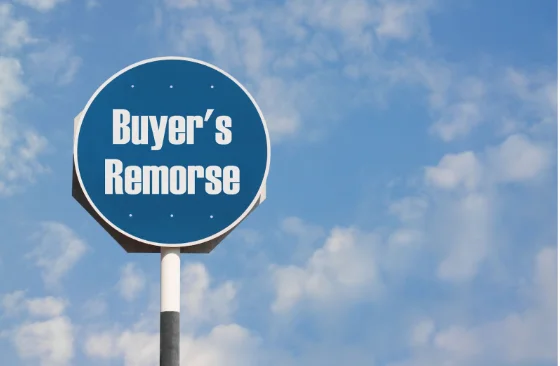Purchasing a new vehicle is often accompanied by excitement and anticipation. However, this initial euphoria quickly dissipates for many, leaving behind a nagging sense of doubt and regret known as car buyer’s remorse. This phenomenon is far from rare, with numerous individuals experiencing a cocktail of anxiety, discomfort, or regret after acquiring a new set of wheels. Such a purchase’s emotional and financial stakes can exacerbate these feelings, making it crucial to understand and navigate buyer’s remorse effectively.
Car Buyer’s Remorse
Buyer’s remorse is that sinking feeling that sets in after making a significant, often expensive, purchase. It’s not just about the money; remorse can also have physical manifestations, such as sweaty palms and nausea, signaling deep-seated anxiety and fear.
The vehicle may strain your finances more than anticipated, or it may fail to meet your expectations in reality. It’s important to differentiate between mere dissatisfaction and instances where the vehicle might be unsafe or not as promised, where legal remedies like lemon laws could apply.
Legal Framework and Car Returns
The myth of a universal “cooling-off” period for car returns persists, yet the reality is less accommodating. The Federal Cooling-Off Rule, which allows buyers to cancel certain sales within three days, notably excludes motor vehicle purchases from its protections. This leaves many car buyers wondering about their options in the face of remorse. While dealership return policies are rare, understanding the specific terms of any available policy is crucial for those seeking a potential exit route.
Is There a Way Out? Can I Return the Car?
The short answer is it depends. The absence of a federally mandated return policy for car dealerships means that any possibility of returning a vehicle rests on the dealership’s policy. Some dealers may offer a grace period for returns or exchanges under specific conditions, such as the car being in new condition with minimal mileage.
However, these policies are far from standard, requiring buyers to inquire and negotiate directly with dealerships for any chance of a resolution.
Always ask the dealer about their car return policies before finalizing the sale of the vehicle!
Preventative Measures Before Buying
The adage “prevention is better than cure” holds especially true in the context of car buying. Conducting thorough research, understanding your financial limits, and critically assessing your needs versus wants can significantly reduce the risk of buyer’s remorse.
Prospective buyers are encouraged to take their time, test drive multiple vehicles, and consider the long-term implications of their purchase to ensure a decision they can live with for years to come.
It’s worth repeating here: Always ask the dealer about their car return policies before finalizing the sale of the vehicle!
Dealing with Buyer’s Remorse After the Purchase
For those already facing buyer’s remorse, all is not lost. There are several steps one can take to mitigate the situation:
- Consider selling the vehicle: While depreciation is a factor, selling the car privately might recoup a greater portion of the initial outlay than trading it in.
- Refinance the auto loan: If the financial burden is the primary source of remorse, refinancing for better terms could provide relief, though it may increase the total cost over time.
- Voluntary repossession: This drastic step should be a last resort due to its severe impact on one’s credit score.
Alternatives to Returning the Car
If returning the car is off the table, alternatives such as trading it in for a different model or negotiating with the dealership for a resolution might be viable. Some dealerships may be willing to work with buyers to find a mutually beneficial solution, especially if it means maintaining a positive customer relationship.
How can I avoid buyer’s remorse in the future?
To avoid buyer’s remorse in the future, take a more deliberate approach to your next purchase by:
- Conducting thorough research on the vehicle types that interest you.
- Set a realistic budget and stick to it.
- Consider your long-term needs and how a vehicle fits into your lifestyle.
- Test driving multiple vehicles to ensure comfort and satisfaction.
- Not rushing into a decision, especially under high-pressure sales tactics.
- Ensure the dealer has a return policy and confirm the specifics of that policy prior to finalizing the sale.
Summary
Car buyer’s remorse is a complex issue rooted in a significant purchase’s emotional and financial implications. While the legal and policy landscape may not always favor the buyer, understanding your options and taking proactive steps can mitigate the impact of remorse. Whether through careful pre-purchase planning or strategic post-purchase actions, it is possible to navigate the choppy waters of buyer’s remorse and emerge with a satisfactory outcome.
FAQs
What immediate steps should I take if I’m experiencing car buyer’s remorse?
If you’re experiencing buyer’s remorse, the first step is to review the sales contract and dealership policies to understand your options. Contacting the dealership to discuss your feelings and potential solutions is also crucial. Assessing your financial situation to determine if refinancing or selling the vehicle is viable may provide some relief.
What if I bought a car that I later found out doesn’t meet my needs, but there’s nothing inherently wrong with it?
If the car doesn’t meet your needs but isn’t defective, your options might be limited to selling it privately or trading it in for a more suitable vehicle. While you may face a financial loss due to depreciation, choosing a car that fits your lifestyle can ultimately lead to greater satisfaction.
New tutenagency customers?
Quote auto insurance online or call (334) 502-5111 to insure your vehicle.
Disclaimer: This content is for informational purposes only and should not be considered legal or financial advice. Always consult with qualified professionals in legal and financial fields before making any decisions.

